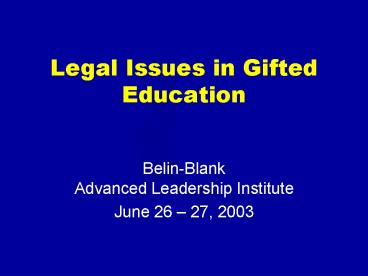Legal Issues in Gifted Education - PowerPoint PPT Presentation
1 / 18
Title:
Legal Issues in Gifted Education
Description:
The Connie Belin & Jacqueline N. Blank International Center ... Negotiation: ... allow for mediation when local negotiation fails in issues of gifted education ... – PowerPoint PPT presentation
Number of Views:139
Avg rating:3.0/5.0
Title: Legal Issues in Gifted Education
1
Legal Issues in Gifted Education
- Belin-Blank
Advanced Leadership Institute - June 26 27, 2003
2
- Laurie J. Croft, Ph.D.
- Administrator, Professional Development
- Belin-Blank Center
- 210 Lindquist Center
- Iowa City, IA 52242
- 800.336.6463 / 319.335.6148
- laurie-croft_at_uiowa.edu
3
No Federal Mandate
- Unlike statutory legal protection afforded
special education students - Legal foundation exists at the state level
- State governments take a variety of approaches
4
State of the States (2001)
- 41 states responded
- 19 states report a full legislative mandate,
requiring some form of identification,
programming, and some personnel dedicated to
gifted education. - 7 states have a partial mandate, which might or
might not include identification or services.
5
State of the States (2001)
- 13 states have no legislative mandate related to
gifted education - Only 2 do not at least have legislative wording
recognizing the educational needs of the gifted - States which mandate identification may or may
not mandate services. - States which mandate services may or may not
mandate teacher preparation.
6
State of the States (2001)
Full Education Mandate
No Education Mandate
Partial Education Mandate
Did not respond
7
Iowa Code 257.43
- Each school or school district shall incorporate
gifted and talented education into its
comprehensive school improvement plan CSIP. - Schools are evaluated for compliance every five
years.
8
Iowa Code
- Identification
- Valid and systematic
- Multiple selection criteria
- Services
- Goals and performance measures
- A qualitatively differentiated program to meet
cognitive and affective needs
9
Iowa Code
- Inservice required for school districts
- Budget (three-quarters - 42 - per student in the
district to be paid by the state one-quarter to
be provided by the district) - Endorsement required to work with gifted children
(12 hours psychology, programming,
administration, practicum)
10
Resolution of Legal Issues
- Negotiation
- Gather relevant documentation (e.g. state law,
board of education rulings court cases) - Begin with local school personnel (e.g. those
responsible for testing / placement) - Keep records of meetings and send follow-up
summaries to all involved
11
- Mediation
- Approximately 20 states allow for mediation when
local negotiation fails in issues of gifted
education - An appointed mediator reviews both sides of the
argument and clearly documents the outcome
12
- Due Process (more costly process)
- Approximately 25 states provide for due process
- Where mediation not available
- Where mediation fails
- Usually in states that include gifted education
as a part of special education - Expert witnesses
- Hearing officer makes the decision
13
- State or Federal Courts
- Costly in time, money, and emotions (Karnes
Marquardt. 2003. Gifted education and legal
issues Procedures and recent decisions. In
Colangelo Davis. Handbook of Gifted Education.
Allyn and Bacon.) - Cases for twice-exceptional children generally
rely on the federal Individuals with Disabilities
Education Act (1997) or Section 504
(Rehabilitation Act, 1973)
14
Relevant Cases
- Conrad Weiser Area School District v. Department
of Education (1992) - Pennsylvania school district rejected parents
request for special services for a gifted child
who had difficulties in writing (child was doing
well in school) - Judge determined child WAS entitled
discrepancy between achievement and mental
ability
15
Relevant Cases
- Fowler v Unified School District No. 259 (1995)
- A child characterized by both giftedness and a
hearing impairment - No interpretive services in gifted program no
gifted program at the School for the Deaf - Judge ruled that federal law provided for
interpretive services
16
Current Issues before the Courts
- Broadley v. Board of Education of the City of
Meridan (1994) - Supreme Court of Connecticut held that the state
constitutional right to a free public education
does not afford gifted children the right to
special education.
17
Reverse Discrimination
- American Civil Rights Institute filed a case
(November 6, 2000 in U.S. Southern District Court
of Florida) to force the state to change its
gifted admissions policy. - Across-the-board IQ score of 130? Groups (black,
Hispanic, low-income children underrepresented). - In 1991, Plan B, minority or low-income
students entry with scores of 115 (academic
potential). - Agreement to eliminate Plan B.
18
Summary Implications
- No federal protection for giftedness
- IDEA will support exceptionalities other than
giftedness - Widely varying state laws
- Limited legal precedents (the future?)
- Families choose to move to different districts
(sometimes in different states) to find settings
that help their children

